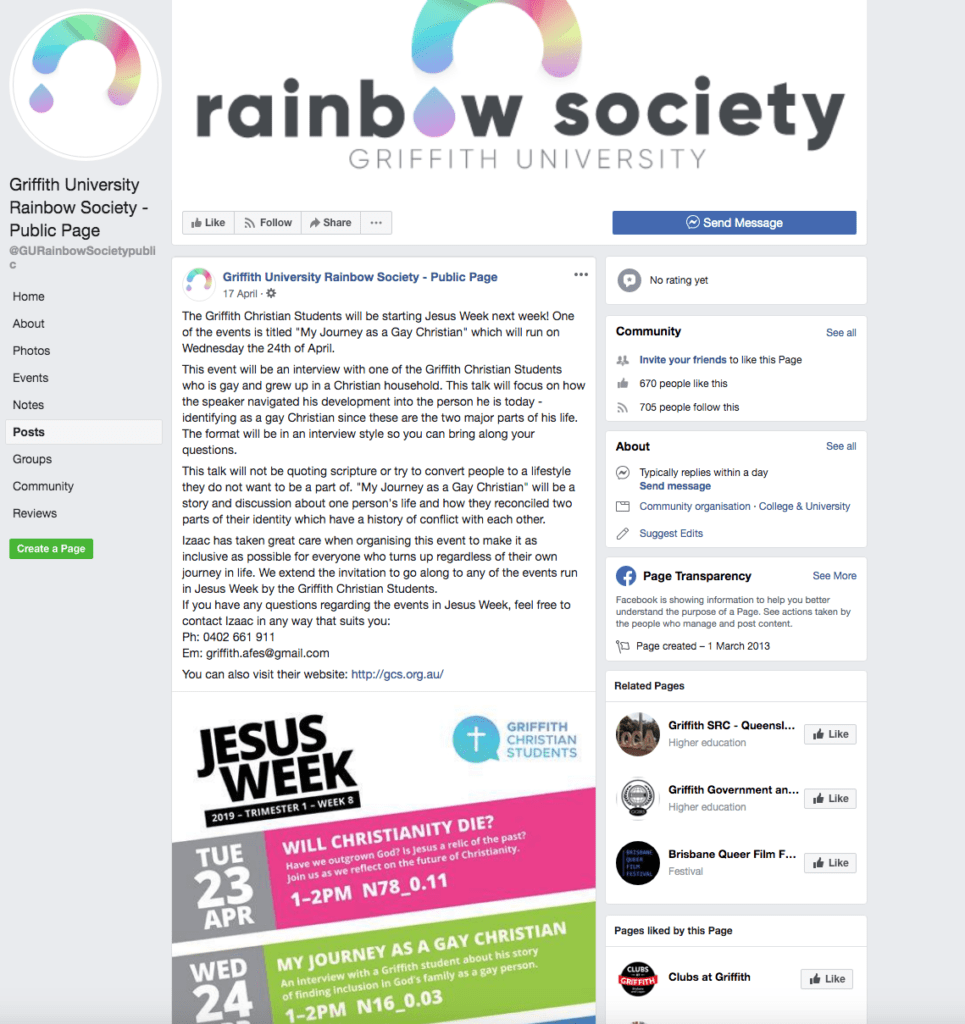This piece is part of a series from the June edition of Eternity Newspaper, where we asked several commentators to respond to the controversy over footballer Israel Folau’s meme condemning sinners – including homosexuals – to hell. Click on the names to read the other responses by Dominic Steele, Christie Buckingham and Tom Richards.
At the same time that Israel Folau was launching a public controversy by shooting a meme into orbit, a university Christian group in Brisbane organised a campus event where a celibate, gay, Christian shared his story about life following Jesus. What was instructive about this event is that the narrative playing out in our media – whether social or traditional – doesn’t always represent real life.
 Perhaps one lesson here is that modern dialogue about being human does not require memes, but real world conversations between real people. Remarkably, the Christian group had included the university’s Rainbow Society in planning the event; the leader of this group helped fill out a risk assessment for the event, and was in attendance at the event, with other members of the group. They stayed afterwards to continue the conversation. My friend had explained what it means for him to pursue life with Jesus as his ultimate love, and source of ultimate good; and he was heard. He was not shouted down, or booted off campus. He did not lose his job (disclosure: he is my trainee).
Perhaps one lesson here is that modern dialogue about being human does not require memes, but real world conversations between real people. Remarkably, the Christian group had included the university’s Rainbow Society in planning the event; the leader of this group helped fill out a risk assessment for the event, and was in attendance at the event, with other members of the group. They stayed afterwards to continue the conversation. My friend had explained what it means for him to pursue life with Jesus as his ultimate love, and source of ultimate good; and he was heard. He was not shouted down, or booted off campus. He did not lose his job (disclosure: he is my trainee).
It’d be easy to sensationalise the Israel Folau imbroglio; countless words have been written dialing the culture war narrative up to eleven, but I’d be careful to jump to too many conclusions about modern gospel conversations – public, or private – from a particular episode involving a meme so reductionist it distorted the message of the gospel
It’d be easy to sensationalise the Israel Folau imbroglio; countless words have been written dialing the culture war narrative up to eleven, but I’d be careful to jump to too many conclusions about modern gospel conversations – public, or private – from a particular episode involving a meme so reductionist it distorted the message of the gospel (John 3:18, for example, suggests that God’s judgment awaits all those people who reject Jesus, for rejecting Jesus). This isn’t to say there aren’t issues surrounding how equipped our world is to grapple with religious issues, but Folau’s meme was so deficient that we should be careful when extrapolating from it to principles for evangelism.
Folau’s meme condemning “homosexuals” flattened out the experience of people like my friend, who submits his sexuality to the Lordship of Jesus.
Folau’s meme condemning “homosexuals” flattened out the experience of people like my friend, who submits his sexuality to the Lordship of Jesus. My friend’s sharing of his story meant he proclaimed the gospel without being “hated” or excluded. Perhaps in response to the Folau story we might redouble our efforts to proclaim the gospel in actual relationships built on love and listening? Perhaps we should rediscover Marshall McLuhan’s maxim “the medium is the message” in our proclamation; such that we avoid memes that inherently reduce and distort the gospel, and instead proclaim it as embodied people living lives that express the truth, beauty, and goodness of Jesus; proclaiming the better story about the full human life found in him.
Nathan Campbell is a campus minister of Living Church, Brisbane.
Email This Story
Why not send this to a friend?


